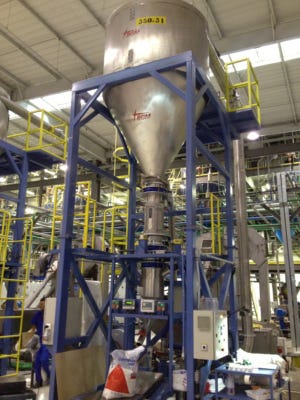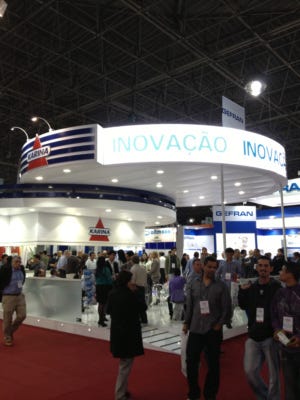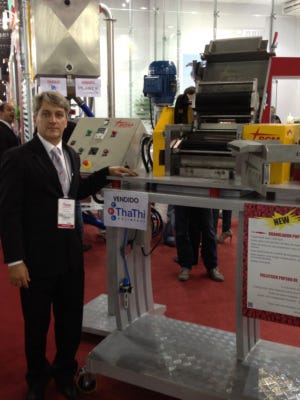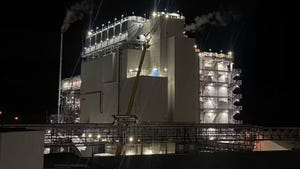Feiplastic: Brazilian PVC compounder finds local solution to bagging issue
São Paulo—When you're compounding 240,000 tonnes of polyvinyl chloride (PVC) per year, small variations in the packaging phase can have big implications for the bottom line. That's the issue Brazil's Karina faced with its 25-kg bags of PVC compounds and masterbatch, which are produced and packaged at its facility in Guarulhos in the state of São Paulo.
June 18, 2013
São Paulo—When you're compounding 240,000 tonnes of polyvinyl chloride (PVC) per year, small variations in the packaging phase can have big implications for the bottom line. That's the issue Brazil's Karina faced with its 25-kg bags of PVC compounds and masterbatch, which are produced and packaged at its facility in Guarulhos in the state of São Paulo.
The company can't sell underweight bags so it erred on the side of overfilling by default. The result: bags were routinely overfilled by as much as 150g, and pellets that Karina had "paid" for in terms of raw materials and labor input left the plant without an economic return.
The family business
Founded in 1979 by Hagop Guerekmezian and his father, an immigrant from Armenia, Karina started in a 800 sq m space with 11 employees, including the Guerekmezian's. Today its sprawling campus covers 150,000 sq m and employs 1000 workers, including the third generation of Guerekmezian, Hagop Guerekmezian Filho.
BGM feeder |
Karina stand Feiplastic 2013 |
Walner Cavallieri, BGM |
At top, BGM's bagging technology helped cut weight variation for Karina's 25-kg packages to only 0.1%; (middle) Karina claims to be the largest compounder of PVC in North America; (at bottom) Walner Cavallieri founded BGM with his father 24 years ago. |
The company bills itself as the largest PVC compound supplier in Latin America, and since 2008, it has started working in the masterbatch space as well, with 2500 tonnes/yr of production there. The main compounding hall holds more than 60 extrusion lines.
A Brazilian machinery solution
Although most of its extrusion lines are German or Italian, the company turned to another Brazilian firm to solve its bag-overfilling problem. Karina worked directly with BGM, a São Paulo based and family owned manufacturer of peripheral equipment for extrusion.
In close collaboration, the companies developed a new gravimetric-based bagging system that lowered finished package variation to 0.1%, with 25-kg bags overfilled by only 10g compared to the previous 150g. In addition, where two machines were required in the past now only one is needed.
"Now we have a nice partnership with BGM," Guerekmezian Filho told PlasticsToday. "We think we have the best development for packaging with BGM." Going forward that partnership is devising a technology to automate Karina's packaging process. At this point in time, the company has16 BGM units, which it uses for larger lines, while making its own bagging systems for smaller lines.
A extrusion equipment epiphany
Drawing its name from the three kings of the nativity (Balthasar, Gaspar, Melchior) BGM is itself a family owned company entering its 25th year in business. Employing 50, it is headed up by Walner Cavallieri, who founded the company with his father and his sister, Leise Cavallieri.
"We look for technology challenges," Cavallieri said, "and we find a technological solution to make it better." Cavallieri noted that in some cases, that business model requires a long-term time commitment, up to three years before any return, but it is also helping to build the company's reputation.
During Feiplastic, Cavallieri said BGM was visited by two U.S. and two German companies that don't have representation in Brazil who we're seeking a qualified local partner. "They checked out the machines, and were impressed," Cavallieri said. "What caught their attention is the quality."
In addition to helping clients like Karina in downstream extrusion applications, Cavallieri said BGM is hoping to move upstream with work currently underway on a design for a twin-screw extrusion system.
"There are no manufacturer for twin-screw extruders in Brazil," Cavallieri said, noting that BGM has developed a new technology for twin screw lines to be used in compounding and masterbatch production. "Right now we make spare parts, but by the next Feiplastic, we will have the whole extruder."
About the Author(s)
You May Also Like





